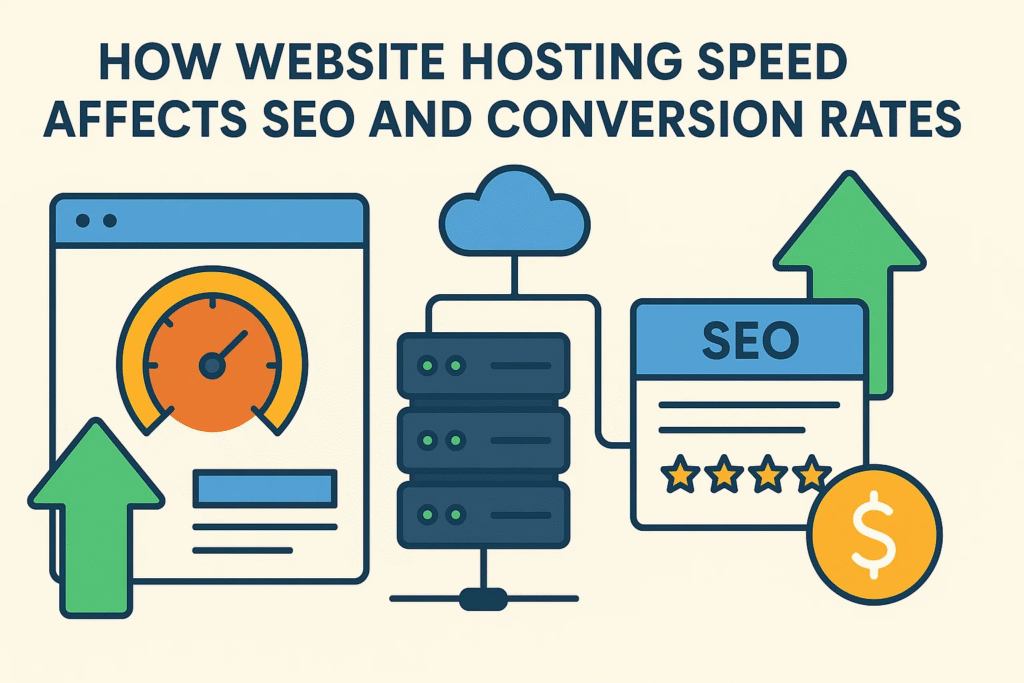In today’s digital world, your website is more than just an online address—it’s your brand’s identity, your digital storefront, and your most powerful marketing asset. Whether you’re a business owner, blogger, or developer, your website’s growth depends not only on great content and design but also on something often overlooked — your hosting solution.
Choosing the right web hosting service can make or break your website’s future. A reliable, scalable hosting plan ensures faster loading speeds, better uptime, smoother traffic handling, and easier management as your audience grows.
Let’s explore the smart ways to expand your website using the right hosting solution, step by step.
1. Understand the Role of Hosting in Website Growth
Before expanding your website, it’s crucial to understand how hosting impacts performance. Hosting is like the foundation of a building — strong foundations allow for higher, more complex structures. The wrong foundation limits growth.
Key Impacts of Hosting:
-
Speed: Your hosting server directly affects your site’s loading time. Slow servers frustrate users and hurt SEO.
-
Uptime: Downtime can mean lost sales, lost trust, and reduced credibility.
-
Scalability: As your website grows, your hosting should easily handle traffic spikes.
-
Security: Hosting services provide firewalls, SSL certificates, and malware protection.
-
Backup & Support: A reliable host ensures daily backups and expert customer service.
So, before you start expanding, make sure your hosting service aligns with your long-term website goals.
2. Identify the Stage of Your Website’s Growth
Different websites require different hosting solutions depending on their traffic, purpose, and growth phase.
| Stage | Website Type | Hosting Type Recommended | Traffic Level | Expansion Goal |
|---|---|---|---|---|
| Beginner | Personal Blog / Portfolio | Shared Hosting | Low | Build initial presence |
| Intermediate | Business Website / Online Store | VPS Hosting | Medium | Improve performance |
| Growing | E-commerce / Agency Site | Cloud Hosting | High | Scale dynamically |
| Advanced | Enterprise / Web Application | Dedicated Hosting | Very High | Custom performance and security |
By recognizing your website’s current stage, you can choose the right hosting upgrade path instead of jumping into an expensive plan too early.
3. Move from Shared to VPS Hosting When You Outgrow the Basics
When your website starts attracting more visitors, shared hosting might not be enough. Shared servers divide resources among many users — meaning if one site consumes more bandwidth, your site slows down.
That’s where VPS (Virtual Private Server) hosting comes in. It acts as a middle ground between shared and dedicated hosting, offering dedicated resources without the high cost.
Benefits of VPS Hosting:
-
Dedicated CPU and RAM for consistent performance.
-
Root access for customization.
-
Enhanced security and data isolation.
-
Easy scalability — upgrade resources without migrating.
If your site’s traffic exceeds 30,000–50,000 visits per month, upgrading to VPS hosting is a smart and cost-effective expansion step.
4. Embrace Cloud Hosting for Scalability
Cloud hosting is the most flexible option for growing websites. Instead of relying on a single physical server, cloud hosting uses multiple connected servers to balance load and maximize uptime.
Why Cloud Hosting Is the Future of Expansion:
-
Automatic Scaling: Resources expand or shrink based on demand.
-
High Uptime: Even if one server fails, others keep your site online.
-
Global Reach: Cloud servers reduce latency by hosting data closer to your audience.
-
Pay for What You Use: You don’t need to pay for unused capacity.
Businesses that expect unpredictable traffic—like eCommerce stores or viral content platforms—should consider migrating to a reliable cloud hosting provider.
5. Optimize Website Performance Through CDN Integration
Even the best hosting plan can’t guarantee lightning-fast performance without a Content Delivery Network (CDN). A CDN distributes your website’s files across global servers, allowing users to access your site from the nearest data center.
CDN Benefits:
-
Faster load times worldwide.
-
Reduced server strain.
-
Enhanced SEO due to improved page speed.
-
Added layer of DDoS protection.
Hosting providers like SiteGround, Cloudways, and Bluehost offer built-in CDN integration—so make sure your host supports it when you expand.
6. Choose SSD-Based Servers for Superior Speed
If your hosting still runs on HDD (Hard Disk Drive) technology, it’s time to upgrade. SSD (Solid State Drive) hosting offers blazing-fast data retrieval and site performance.
Why SSD Hosting Matters:
-
Pages load up to 300% faster.
-
Improved caching and database queries.
-
Better uptime and reliability.
This simple upgrade can make a huge difference, especially for websites with heavy images, videos, or large product catalogs.
7. Focus on Security Upgrades Before Scaling
As your site grows, so does its vulnerability. A hacked or infected website can destroy years of effort overnight. Before expanding, ensure your hosting offers enterprise-level security.
Key Hosting Security Features to Look For:
-
Free SSL Certificates
-
Daily Backups
-
Malware Scanning & Removal
-
DDoS Protection
-
Firewall (WAF) Support
-
Two-Factor Authentication (2FA) for Admin Access
A secure hosting environment not only protects your data but also builds customer trust—essential for business growth.
8. Use Managed WordPress Hosting for Hassle-Free Expansion
If your website is powered by WordPress, consider moving to Managed WordPress Hosting. It takes care of updates, security, and performance optimization so you can focus on creating content and marketing.
Advantages of Managed WordPress Hosting:
-
Automatic WordPress updates.
-
Expert-level support.
-
Built-in caching and speed optimization.
-
Staging environments for testing changes.
-
Free migrations and backups.
This hosting type is ideal for bloggers, entrepreneurs, and agencies who want to expand their WordPress websites without technical headaches.
9. Leverage Backup and Restore Features
When expanding your site — adding plugins, redesigning pages, or integrating new tools — you’re taking risks. A single plugin conflict can break your site.
That’s why regular backups are non-negotiable.
Look for hosting providers that offer:
-
Automatic daily backups
-
One-click restore options
-
Offsite storage (e.g., cloud or external servers)
This ensures your data is always safe, no matter what happens during your expansion phase.
10. Monitor and Analyze Performance Regularly
Expansion isn’t a one-time event; it’s an ongoing process. You must continually monitor your site’s performance to ensure smooth operation as traffic grows.
Key Metrics to Track:
-
Page load time
-
Server response time
-
Uptime percentage
-
Bandwidth usage
-
Error rates
Most premium hosting dashboards include analytics tools or integrations with Google Analytics and Pingdom. Regular monitoring helps you identify when it’s time to upgrade resources again.
11. Add Staging Environments for Safe Testing
Before launching major updates or new sections of your site, use a staging environment — a clone of your website where you can test everything safely.
Benefits of a Staging Site:
-
Test plugins, designs, or code without affecting the live site.
-
Prevent downtime from broken updates.
-
Roll back changes easily.
Many hosting providers (especially managed WordPress hosts) include staging with one click. It’s a must-have feature for smooth website expansion.
12. Plan for Global Expansion with Multisite or Geo-Hosting
If you’re targeting new regions or audiences, consider geo-hosting (multiple server locations) or WordPress Multisite to manage multiple websites under one dashboard.
Why This Matters:
-
Faster local access for users.
-
Easier brand management across countries.
-
Simplified maintenance and security control.
Choose hosting providers that offer data centers across continents to support global reach.
13. Optimize Your Database and Server Configuration
As your website grows, your database becomes heavier. Optimizing it regularly helps maintain speed and prevent crashes.
Optimization Tips:
-
Delete unused plugins and themes.
-
Use caching plugins (like WP Rocket or W3 Total Cache).
-
Clean spam comments and post revisions.
-
Use PHP 8.0 or later for faster execution.
Some hosting services even offer automated optimization tools — a great feature for expanding websites.
14. Explore Hybrid and Dedicated Hosting for Large Enterprises
For enterprise-level websites with millions of monthly visitors, dedicated or hybrid hosting is the ultimate choice.
Dedicated Hosting:
-
Complete control of a physical server.
-
Highest level of performance and security.
-
Ideal for custom applications or heavy traffic.
Hybrid Hosting:
-
Combines dedicated and cloud hosting.
-
Best for businesses requiring flexibility and reliability.
If your brand is scaling globally or handling large databases, investing in dedicated hosting ensures maximum stability and customer trust.
15. Build a Hosting Upgrade Strategy
The smartest way to expand your website is to create a clear upgrade roadmap. Don’t wait until your site crashes due to high traffic — plan ahead.
Hosting Upgrade Strategy Example:
| Stage | Traffic Range | Recommended Hosting | Primary Goal |
|---|---|---|---|
| 0–10K Visitors/Month | Shared Hosting | Build presence | |
| 10K–50K Visitors/Month | VPS Hosting | Speed & performance | |
| 50K–200K Visitors/Month | Cloud Hosting | Scale dynamically | |
| 200K+ Visitors/Month | Dedicated/Hybrid Hosting | Optimize for enterprise |
By following a planned upgrade path, you ensure smooth transitions without losing uptime or performance.
16. Choose a Hosting Partner with Excellent Support
No matter how powerful your hosting plan is, it’s only as good as its customer support. When expanding your website, you’ll likely encounter technical issues, migration challenges, or security alerts.
What to Look for in Support:
-
24/7 Live Chat & Phone Support
-
WordPress-specific expertise
-
Migration assistance
-
Transparent service-level agreements (SLAs)
A responsive support team can save you hours of frustration and help you expand with confidence.
17. Use Auto-Scaling and Load Balancing for Traffic Spikes
When you run seasonal sales, campaigns, or product launches, traffic can surge suddenly. Without preparation, this can crash your site.
Auto-scaling and load-balancing solutions allow your hosting to dynamically allocate resources based on demand — ensuring zero downtime during peak hours.
If your host offers auto-scaling, enable it to handle sudden traffic jumps effortlessly.
18. Stay Eco-Friendly with Green Hosting
As websites grow, so does their energy consumption. Many hosting providers now offer green hosting — servers powered by renewable energy.
Why It’s Smart:
-
Reduces carbon footprint.
-
Appeals to environmentally conscious customers.
-
Demonstrates brand responsibility.
Choosing a sustainable host supports both your business and the planet.
19. Simplify Management with cPanel or Custom Dashboards
Expansion means more tasks—more domains, emails, databases, and backups to manage. Hosting with a user-friendly dashboard like cPanel or a custom interface makes management easy even for non-tech users.
Look for features like:
-
One-click app installations
-
File management tools
-
Domain & DNS control
-
Email setup options
A simplified interface helps you focus more on growth and less on tech headaches.
20. Keep Learning and Adapting
Technology evolves rapidly. The hosting solution perfect for your website today might not be ideal next year. Keep learning about:
-
New hosting technologies (like NVMe SSDs, LiteSpeed servers).
-
Updated WordPress performance trends.
-
AI-powered optimization tools.
Regularly evaluate your hosting provider’s performance and be ready to adapt. Continuous improvement is the smartest expansion strategy of all.
Final Thoughts
Expanding a website isn’t just about adding more pages or products. It’s about ensuring your digital infrastructure grows with your audience.
The right hosting solution acts as your backbone—supporting speed, security, scalability, and reliability.
When you invest wisely in hosting, you’re not just buying server space—you’re building the foundation for long-term digital success.
So, take time to evaluate your current hosting setup, assess your website’s growth stage, and choose a solution that evolves with your goals.
Because in the digital world, smart hosting equals smart growth.


